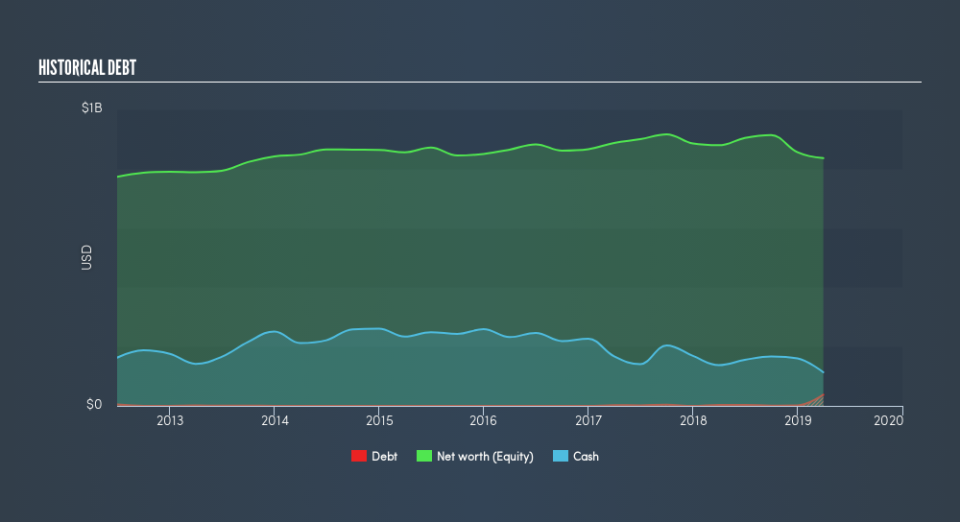All You Need To Know About Simpson Manufacturing Co., Inc.'s (NYSE:SSD) Financial Health

Want to participate in a short research study? Help shape the future of investing tools and you could win a $250 gift card!
Small-caps and large-caps are wildly popular among investors, however, mid-cap stocks, such as Simpson Manufacturing Co., Inc. (NYSE:SSD), with a market capitalization of US$2.9b, rarely draw their attention from the investing community. However, history shows that overlooked mid-cap companies have performed better on a risk-adjusted manner than the smaller and larger segment of the market. SSD’s financial liquidity and debt position will be analysed in this article, to get an idea of whether the company can fund opportunities for strategic growth and maintain strength through economic downturns. Remember this is a very top-level look that focuses exclusively on financial health, so I recommend a deeper analysis into SSD here.
See our latest analysis for Simpson Manufacturing
SSD’s Debt (And Cash Flows)
SSD's debt levels surged from US$3.5m to US$38m over the last 12 months , which is mainly comprised of near term debt. With this rise in debt, the current cash and short-term investment levels stands at US$113m to keep the business going. Moreover, SSD has generated cash from operations of US$153m over the same time period, resulting in an operating cash to total debt ratio of 406%, signalling that SSD’s debt is appropriately covered by operating cash.
Can SSD meet its short-term obligations with the cash in hand?
Looking at SSD’s US$151m in current liabilities, it seems that the business has been able to meet these obligations given the level of current assets of US$576m, with a current ratio of 3.82x. The current ratio is calculated by dividing current assets by current liabilities. However, a ratio above 3x may be considered excessive by some investors, yet this is not usually a major negative for a company.
Does SSD face the risk of succumbing to its debt-load?
Debt-to-equity ratio standards differ between industries, as some are more capital-intensive than others, meaning they need more capital to carry out core operations. Generally, mid-cap stocks are considered financially healthy if its ratio is below 40%. For Simpson Manufacturing, investors should not worry about its debt levels because the company has very, very little on its balance sheet! It has been operating its business with miniscule debt and utilising only its equity capital. Investors' risk associated with debt is virtually non-existent with SSD, and the company has plenty of headroom and ability to raise debt should it need to in the future.
Next Steps:
SSD’s high cash coverage and low debt levels indicate its ability to utilise its borrowings efficiently in order to generate ample cash flow. Furthermore, the company exhibits proper management of current assets and upcoming liabilities. This is only a rough assessment of financial health, and I'm sure SSD has company-specific issues impacting its capital structure decisions. You should continue to research Simpson Manufacturing to get a better picture of the stock by looking at:
Future Outlook: What are well-informed industry analysts predicting for SSD’s future growth? Take a look at our free research report of analyst consensus for SSD’s outlook.
Valuation: What is SSD worth today? Is the stock undervalued, even when its growth outlook is factored into its intrinsic value? The intrinsic value infographic in our free research report helps visualize whether SSD is currently mispriced by the market.
Other High-Performing Stocks: Are there other stocks that provide better prospects with proven track records? Explore our free list of these great stocks here.
We aim to bring you long-term focused research analysis driven by fundamental data. Note that our analysis may not factor in the latest price-sensitive company announcements or qualitative material.
If you spot an error that warrants correction, please contact the editor at editorial-team@simplywallst.com. This article by Simply Wall St is general in nature. It does not constitute a recommendation to buy or sell any stock, and does not take account of your objectives, or your financial situation. Simply Wall St has no position in the stocks mentioned. Thank you for reading.


